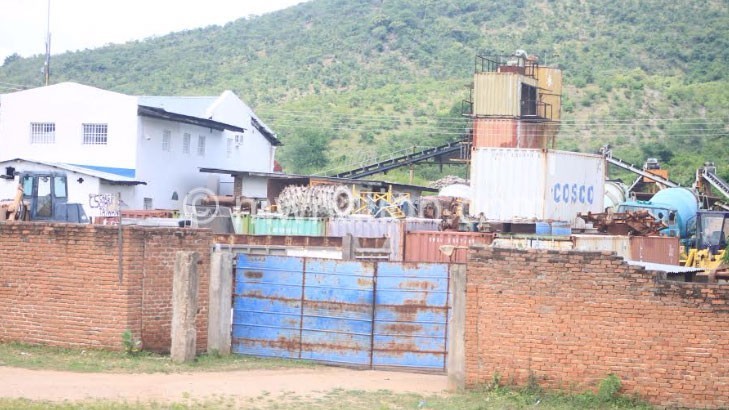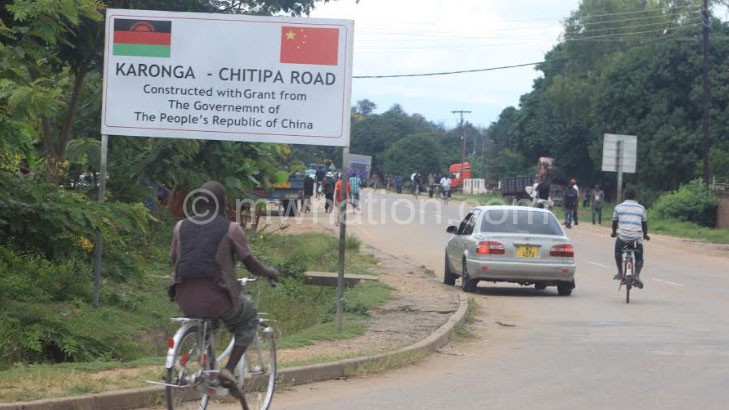Rusty remains of Malawi-Taiwan ties
This work was first published as part of ‘Chitipa’s $70m Lifeline’ in Nation on Sunday (Malawi) of July 23, 2017.
Save for a whitewashed garage, it looks like a scrap yard. Silence is resounding. The earth-shaking machines in sight roar no more. They have been motionless for nine years now.

In the brick-and-mortar fence, tops of rusty machines pop into view—mixers, bulldozers, excavators, tractors, loaders, tippers and more.
Yet this is neither a dumpsite nor a museum of construction machinery.
According to a guard at the seemingly abandoned campus at the foot of Lasha Hill, almost five kilometres north-west of Karonga Town, not all of them are non-runners.
“Almost all were working perfectly 10 years ago. Some are still usable,” he says.
He looks forward to a day the aging assets will be auctioned or hauled away to a site where they will be useful.
But everything is rusting, even memories.
Welcome to the relics of Taiwan’s fading footsteps in Malawi.
“CS Chaser Company Taiwan,” reads a highly colluded, scratched signpost by the gates of the property which has defied nearly a decade of diplomatic deadlock.
It bears testimony to Taiwan’s uneasy withdrawal after Malawi switched ties to Mainland China in 2007.
Then, the Taiwanese company contracted to construct the Karonga-Chitipa Road was swiftly substituted with China Roads and Bridges Corporation, when Lilongwe defected from Taipei to Beijing.
By 2004 general elections, Chaser had thinly macadamised a small section of the road, which doubters described as prolongation of a vote-seeking ploy for the United Democratic Front (UDF), which was in power.
Bingu wa Mutharika narrowly won the presidency on UDF ticket, but the tarred stretch of the road was beaten and hugely wiped out when he dramatically defected from the yellow party to found Democratic Progressive Party (DPP) in 2005.

At the time, Bingu’s Minister of Transport, Sidik Mia, toured the Karonga-Chitipa Road to ascertain progress.
In the shadow of the leafy hill, Mia three times asked the Taiwanese contractors if they had really bitumised the shattered section previously.
Such was the cracking start of the road named after Bingu, who sealed the Malawi-China deal.
What-ifs and maybes
The locals wanted a speedy stop to on-off and substandard works when the minister promised a “stronger, straighter, wider and smoother road”.
Gaping potholes on the Chinese-built tarmac have rekindled doubts about its durability.
But cutting unnecessary corners has shortened the 112-kilometre road to just 93 kilometres. Its breadth and finish are appreciable, certainly.
Vanishing are the travel woes and memories of the Taiwanese, who suffered a public backlash when some workers were photographed using hoes to clear the slopes.
Fellow journalist Francis Tayanjah-Phiri said it was quirky that the contractors were using hoes “like gravediggers” just when Chitipa wanted a modern road.
This worsened fears that the road would not be up to standard.
Dogs and snakes
Chaser’s exit did not just mark the start of the Chinese company’s turn.
It affirmed Lilongwe’s sensational decision to sever ties with the island of Taiwan, formerly Formosa, which were already in question when some ministers revolted against founding president Hastings Kamuzu Banda 53 years ago.
Speaking in Parliament on September 8 1964, Kamuzu disclosed that the Cabinet Crisis was not just about the minister’s indignation to his alleged dictatorial tendencies and introduction of tick payment in hospitals, but why he had not recognised Perking China.
“There was only one China, they said, and that was Perking China. There were no two Chinas. Formosa only existed, they said, because Americans keep it there,” he said in reaction to a vote of no confidence.
He defended his siding with Taiwan, saying the question of Formosa would have to come up before the United Nations as “you cannot ignore seven million people forever”.
Kamuzu sensationally sacked the four ministers—Kanyama Chiume, Yatuta Chisiza, Augustine Bwanausi, Orton Chirwa and Rose Chibambo—whom he accused of being inflamed by a stirring hand of the Chinese Embassy in Dar es Salaam, Tanzania.
He told Parliament: “Twice the Ambassador has been here to see me. Twice he has asked me to recognise his government. Twice I have said neither no nor yes. I have said I will study it.
“On my way from Cairo, I stopped in Dar es Salaam at the State House. The Chinese Ambassador came to see me. He repeated his request that I recognise Perking China.
“He did not say he would give Malawi $18 million. He said $6 million. Do you blame me if I associate the offer of $18 million and the intransigence, disunity, disloyalty and indiscipline in the Cabinet?”
In 2007, news of the end of the 41-year-old marriage with Taiwan began with refuted media revelations with Taipei urging Lilongwe against being bought by evil forces from China.
But the bond had already snapped when Taiwan’s Foreign Ministry accused China of luring its allies with cash incentives ten years ago.
Hitting back, Patricia Kaliati, then Minister of Information, sarcastically asked the Taiwanese to give back all the snakes and dogs they had eaten in Malawi.
Joyce Banda, who was then Minister of Foreign Affairs, finally announced that Malawi had officially switched its allegiance to China on December 27 2007.
“We have decided to switch from Taiwan to Mainland China after careful consideration of benefits that we would be getting from Mainland China,” she said on January 14 2008.
Splitting the difference
Karonga-Chitipa Road is the first fruit of this “very, very, very good relationship with China”, Minister of Transport Jappie Mhango was once quoted as saying.
Chinese Ambassador Wang Shin-Ting has not responded to our questions about how much his country has invested and gained since his predecessor Lin Songtian announced the “win-win co-operation”.
“The ambassador considers the success story of Chitipa Road as a very important part of China’s relationship with Malawi, but he needs more time to respond to your questions,” said his political attaché after several follow-ups since May.
But former Minister of Foreign Affairs and International Cooperation Francis Kasaila waxed lyrical about China’s investment in Malawi.
He said: “In the Government of China, we have a trusted partner and we are grateful that this relationship is not all about politics, but development.
“The most interesting thing is that China comes in to support our vision, and not to impose conditions which may not be good for us or contrary to our vision.”
This could be a restrained swipe at Western allies who have closed aid taps in protest to corruption and impunity.
“In China, we have a listening and true development partner who respects our aspirations,” Kasaila said.
He commended Beijing for accomplishing all projects it pledged for a start.
Besides the Karonga-Chitipa Road, their projects included Malawi University of Science and Technology (Must) in Thyolo as well as the Bingu International Convention Centre, the six-star President’s Hotel, Presidential Villas, Parliament Building and the Bingu National Stadium in Lilongwe.
Ambassador Shin-Ting recently told The Nation that China’s investment in Africa is firmly rooted in the belief that ‘it is better to share happiness than to enjoy it alone’.
“China has achieved tremendous economic growth, but we believe the world can become a better place only through sharing wealth and common development approaches,” he said.
In Beijing, economists and development strategists are talking about One Belt, One Road, an ambitious plan to link China with economic hotspots globally by knitting roads, ports, railways and other transport corridors.
In this spirit, the upgrade of the Karonga-Chitipa Road has transformed international trade in the border district that wedges between Zambia and Tanzania.
Goods trickling in through Kanyala border between Malawi and Zambia as well as Ilomba on the boundary with Tanzania are increasingly visible in Karonga and Chitipa.
Traders say the tarmac road has enhanced cross-border trade.
They find it easy to transport imported goods to business destinations.
Exports and imports aside, the road passes through the mineral-rich hills in Karonga north-west, the home of Kayelekera Uranium Mine and three coalmines.
The road eases transportation of the minerals and farm produce to various markets in the Northern Region and beyond.
From the stillness of the rusty gates of the deserted campus, busloads of people and truckloads of goods on the long-awaited highway are noticeable.
To the Minister of Transport and Public Works, the increasing traffic means money going into the ailing economy and people’s pockets.
Said Mhango: “Nowadays, people have the ease to travel from Chitipa to Karonga and back in no time. The economic benefits of cutting travel time to Chitipa and the rest of the country are enormous. Every second, money is changing hands and people have more time to do business and work.”





